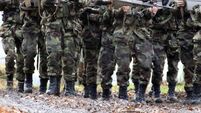Walsh ‘vindicated’ by €500k settlement

Mr Walsh sued The Sun’s publishers, Newsgroup Newspapers, for defamation which arose out of false allegations made by Leonard Watters.
In January, Mr Watters, aged 24, from Navan in Co Meath, was sentenced to six months in jail after pleading guilty to making false reports to gardaí that Mr Walsh groped him in a toilet in a Dublin nightclub on Apr 9, 2011.













